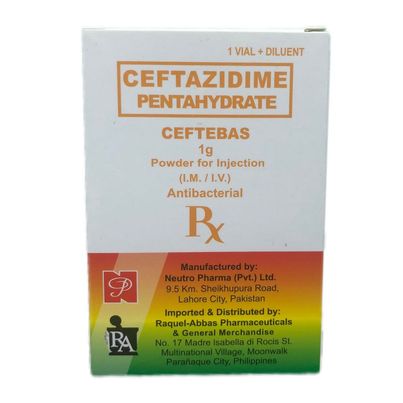Bambang Pharmaceutical Depot Inc.
Ceftazidime Pentahydrate (Ceftebas) 1g Powder For Injection (I.M/I.V) Diluent Vial 1's
Ceftazidime Pentahydrate (Ceftebas) 1g Powder For Injection (I.M/I.V) Diluent Vial 1's
Couldn't load pickup availability
Antibacterial
Storage: Store at temperature not exceeding 30°C. Protect from sunlight.
DO NOT FREEZE.
Certainly! Here’s an overview of Ceftazidime Pentahydrate (Ceftebas) 1g Powder for Injection (I.M/I.V) Diluent Vial 1's:
Product Description:
Ceftazidime Pentahydrate (Ceftebas) 1g Powder for Injection is an antibiotic belonging to the class of cephalosporins, which are beta-lactam antibiotics. Ceftazidime is used to treat a variety of bacterial infections by inhibiting the bacterial cell wall synthesis, which ultimately leads to the destruction of the bacteria. It is effective against a wide range of Gram-negative and Gram-positive bacteria, making it a broad-spectrum antibiotic.
The product comes as a 1g powder, which is reconstituted with a diluent before being administered either through intravenous (IV) or intramuscular (IM) injection. Ceftazidime (Ceftebas) is typically used in hospital settings for severe bacterial infections that require prompt antibiotic therapy.
Indications:
Ceftazidime Pentahydrate (Ceftebas) is used for the treatment of the following bacterial infections:
-
Lower respiratory tract infections (e.g., pneumonia)
-
Urinary tract infections (e.g., cystitis, pyelonephritis)
-
Skin and soft tissue infections (e.g., cellulitis, abscesses)
-
Intra-abdominal infections (e.g., peritonitis, abscesses)
-
Bone and joint infections (e.g., osteomyelitis)
-
Gonorrhea
-
Sepsis (severe systemic infection)
-
Meningitis (inflammation of the lining of the brain and spinal cord)
-
Febrile neutropenia (fever in patients with low white blood cell count, typically due to chemotherapy)
It is also used to treat infections caused by Pseudomonas aeruginosa, a common pathogen that can cause infections in immunocompromised individuals, such as those with cystic fibrosis or those on ventilators.
Dosage:
The dosage of Ceftazidime Pentahydrate (Ceftebas) varies depending on the severity of the infection, the patient's age, kidney function, and other factors. Below are the typical dosage recommendations:
-
Adults:
-
General infections: 1g every 8 to 12 hours, administered via IM or IV.
-
For more severe infections, or in cases requiring higher doses, 2g every 8 hours may be used.
-
Severe infections (e.g., pneumonia, meningitis, sepsis): The usual dose is 2g every 8 hours.
-
-
Children (over 2 months of age):
-
The typical pediatric dose is 30 mg/kg to 50 mg/kg administered every 8 hours. However, the dose can be adjusted depending on the infection severity and type.
-
-
Renal Impairment:
-
For patients with renal dysfunction, the dosage may need to be adjusted. The standard dose should be reduced or the interval between doses extended to account for slower drug elimination.
-
-
Reconstitution: The powder should be mixed with the appropriate diluent (as specified by the manufacturer) to prepare a solution suitable for injection. The concentration of the prepared solution should be as recommended for IV or IM use.
Note: Always follow the exact dosage instructions provided by a healthcare provider or as specified by the prescribing information.
Side Effects:
Like all medications, Ceftazidime Pentahydrate (Ceftebas) may cause side effects, although not everyone experiences them. Common side effects include:
-
Gastrointestinal disturbances:
-
Nausea, vomiting, diarrhea, abdominal pain
-
C. difficile-associated diarrhea (an overgrowth of Clostridium difficile in the intestines)
-
-
Allergic reactions:
-
Rash, itching, or swelling (especially on the face/tongue/throat)
-
Severe allergic reactions (anaphylaxis) can occur but are rare.
-
-
Hematologic effects:
-
Changes in blood counts, such as leukopenia (low white blood cells), thrombocytopenia (low platelets), or eosinophilia (elevated eosinophils).
-
-
Injection site reactions:
-
Pain, redness, or swelling at the site of injection (either IM or IV).
-
-
Liver and kidney effects:
-
Mild to moderate increases in liver enzymes (transaminases, alkaline phosphatase).
-
Renal toxicity, especially in patients with pre-existing kidney conditions.
-
-
CNS effects:
-
Headache, dizziness, confusion, or seizures (in severe cases, especially with higher doses or in patients with renal dysfunction).
-
Contraindications:
Ceftazidime Pentahydrate (Ceftebas) should not be used in the following situations:
-
Hypersensitivity (allergy) to Ceftazidime, cephalosporins, or any component of the formulation.
-
Patients with a history of severe allergic reactions (e.g., anaphylaxis) to penicillin or other beta-lactam antibiotics should avoid using cephalosporins due to cross-reactivity.
-
-
Severe renal impairment (without dosage adjustments): In patients with severely impaired renal function, Ceftazidime should be used with caution, and the dosage must be adjusted accordingly.
-
Neonates: Ceftazidime should be used cautiously in neonates, especially those with immature renal function, as the drug may accumulate to dangerous levels if dosing is not properly adjusted.
Precautions:
-
Renal Impairment: Use with caution in patients with kidney problems, as Ceftazidime is excreted through the kidneys, and inadequate renal function may lead to accumulation of the drug.
-
Allergic Reactions: Patients with a known history of penicillin or cephalosporin allergy should be closely monitored, as there is a potential for cross-reactivity.
-
Gastrointestinal Disorders: Use caution in patients with a history of gastrointestinal diseases like colitis, as Ceftazidime may alter the normal flora in the intestines and increase the risk of Clostridium difficile infection.
-
Pregnancy and Lactation: Ceftazidime is classified as Category B for pregnancy, meaning it is not expected to harm a fetus based on animal studies, but should only be used when absolutely necessary during pregnancy. It is excreted into breast milk, so caution is advised when administering it to nursing mothers.
-
Superinfection: Prolonged use of Ceftazidime can result in the growth of resistant bacteria or fungi, leading to secondary infections.
Storage:
-
Ceftazidime Pentahydrate (Ceftebas) powder should be stored at room temperature (20-25°C or 68-77°F), away from moisture and heat.
-
Reconstituted solutions should be used immediately or stored according to the manufacturer's instructions (usually in a refrigerator for no longer than 24 hours).
-
Keep out of reach of children.
This summary provides general information on Ceftazidime Pentahydrate (Ceftebas) 1g Powder for Injection. Always consult your healthcare provider for more specific information, appropriate dosing, and guidance tailored to your individual health needs.
Share

Product Features
Highlights
Details
Lot #
Expiry Date
"For All Your Pharma And Medical Supply Needs"
-
MEDICINES
We offer large range of generics and branded tablets, capsules, topicals, suppositories, drops or suspensions, inhalers and injections.
-
SUPPLEMENTS
High quality yet very affordable vitamins and minerals, specialty supplements, herbals and botanicals, sports nutrition, and weight management.
-
MEDICAL SUPPLIES
We serve all types of medical supplies needed in clinics, laboratories, and hospitals like cottons, gauze, alcohol, swabs, gloves, bandages, lancets, glucometer, etc.
-
MEDICAL EQUIPMENT
We also serve durable and affordable medical devices and equipment needed in clinics, laboratories and hospitals.
Subscribe to our emails
Be the first to know about new collections and exclusive offers of Bambang Pharmaceutical Depot Inc.


